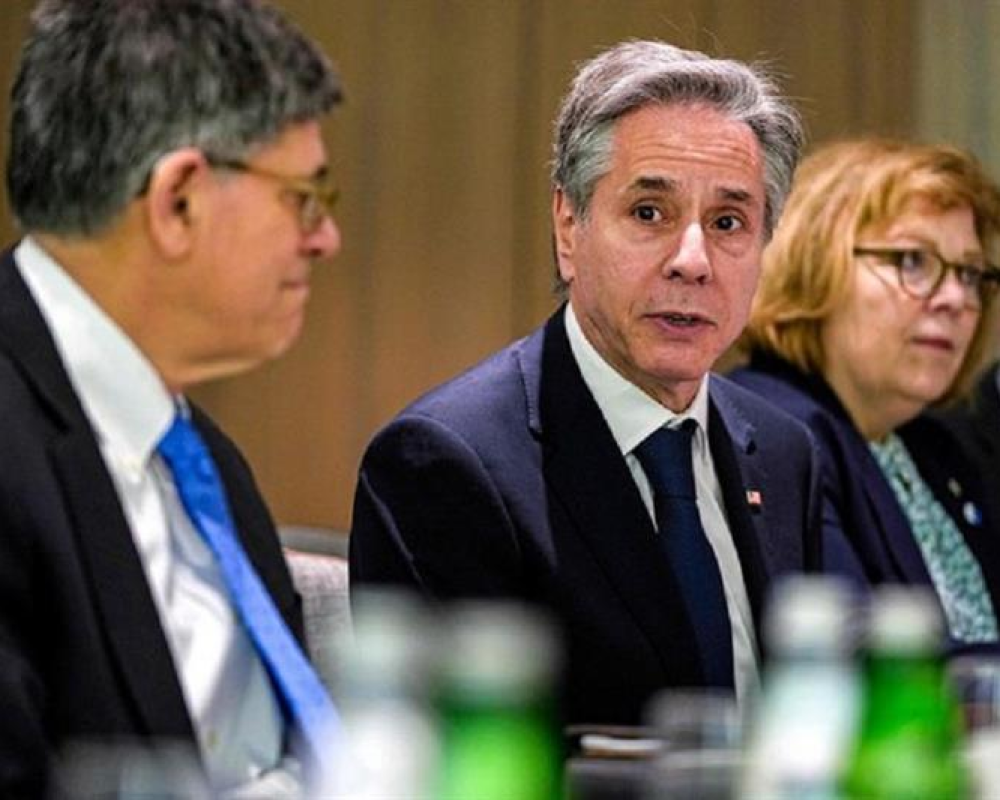
Bethlehem / PNN/
U.S. Secretary of State Antony Blinken left the Middle East on Thursday with public divisions between the United States and Israel at perhaps their worst level since Israel’s war on Gaza began in October.
Wrapping up a four-nation Mideast trip — his fifth to the region since the war erupted — Blinken was returning to Washington after getting a virtual slap in the face from Israeli Prime Minister Benjamin Netanyahu, who said the war would continue until Israel is completely victorious and rejected outright a response from Hamas to a proposed cease-fire plan.
Relations between Israel and its main international ally, the United States, have been tense for months, but Netanyahu's public dismissal of a plan the U.S. says has merit, at least as a starting point for further negotiation, highlighted the divide.
Yet Blinken and other U.S. officials said they remained optimistic that progress could be made on their main goals of improving humanitarian conditions for Palestinian civilians, securing the release of Israeli captives, preparing for a post-conflict Gaza, and preventing the war from spreading.
Officials said Blinken’s optimism was based on his first four post-Oct. 7 trips to the Middle East. None of those visits resulted in immediate visible successes, but they brought limited but significant improvements in the delivery of humanitarian aid and a weeklong cease-fire in November.
“There are things that Hamas sent back that are non-starters,” Blinken said of the response the group delivered Tuesday to a cease-fire and captives release proposal that was endorsed last month by Egypt, Qatar, the U.S., and Israel itself.
“But, at the same time, we see space to continue to pursue an agreement,” Blinken said late Wednesday. “And these things are always negotiations. It’s not flipping a light switch. It’s not ‘yes’ or ‘no.' There’s invariably back and forth.”
Shortly before Blinken spoke, though, Netanyahu took direct aim at the Hamas response, calling it “delusional” and vowing that Israel would fight on to achieve “absolute victory”, no matter what.
Compounding Blinken’s dilemma, Netanyahu also appeared to dismiss concerns from the U.S. and others about expanding Israel’s military operations in southern Gaza, particularly in Rafah, the area on the Egyptian border to which over a million Palestinians have fled.
“On all of my previous visits here and pretty much every day in between, we have pressed Israel in concrete ways to strengthen civilian protection, to get more assistance to those who need it. And over the past four months, Israel has taken important steps to do just that,” he said. “And yet, the daily toll that its military operations continue to take on innocent civilians remains too high.”
Blinken also made the harshest US critique of the Israeli offensive on Gaza, saying that Israel cannot use Oct. 7 as a ‘license to dehumanize others”.
“The overwhelming majority of people in Gaza had nothing to do with the attacks of October 7,” he said at a Tel Aviv press conference.
US top diplomat also stressed that Israel "must ensure that the delivery of life-saving assistance to Gaza is not blocked for any reason, by anyone," alluding to Israeli protests at Karm Abu Salem crossing and attacks on aid convoys heading towards Gaza.
He also for the first time publicly called on Israel to re-open its Erez Crossing, which would allow aid to reach northern Gaza more directly.
In what it appeared to be an attempt to ignore Netanyahu, Blinken discussed the proposed captives deal with the Israeli war cabinet a day after the PM rejected Hamas demands.
Blinken met in Tel Aviv with Benny Gantz and Gabi Eisenkot, two former military chiefs who joined Netanyahu's war cabinet since the war erupted.
In mid-January, NBC News reported that US President Joe Biden is becoming increasingly frustrated with Netanyahu and his rejection of most of the administration's recent requests related to the war on Gaza.
US officials told NBC that the Biden administration is trying to lay the groundwork with other Israeli and civil society leaders in anticipation of an eventual post-Netanyahu government.
In an attempt to work around Netanyahu, Blinken in his January visit to Israel met individually with members of his war Cabinet and other Israeli leaders, including opposition leader and former Prime Minister Yair Lapid.
The former US Secretary of State and presidential candidate has said that Netanyahu “absolutely needs to go” for his handling of the war.
“Netanyahu should go. He is not a trustworthy leader. It was on his watch that the [October 7] attack happened,” Clinton told MSNBC.
“He needs to go, and if he’s an obstacle to a ceasefire, if he’s an obstacle to exploring what’s to be done the day after, he needs to go.”
Clinton, however, defended Israel’s conduct in its war on Gaza.